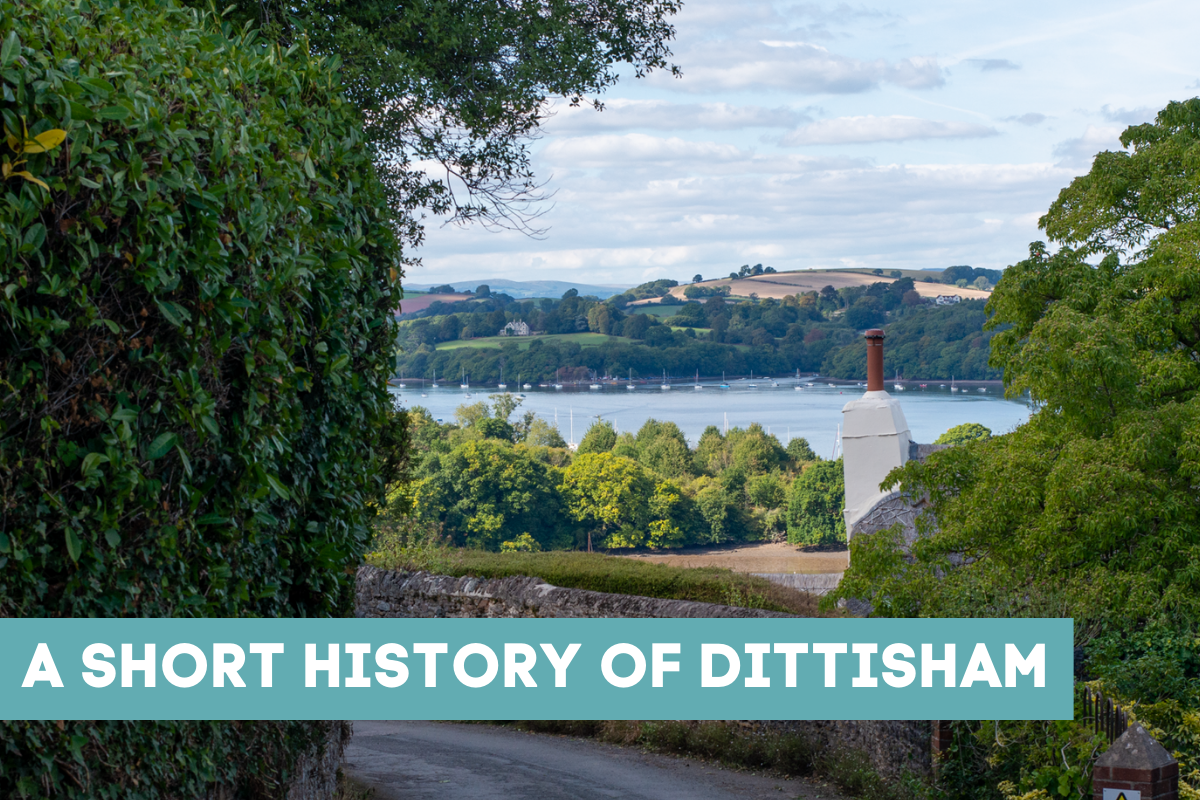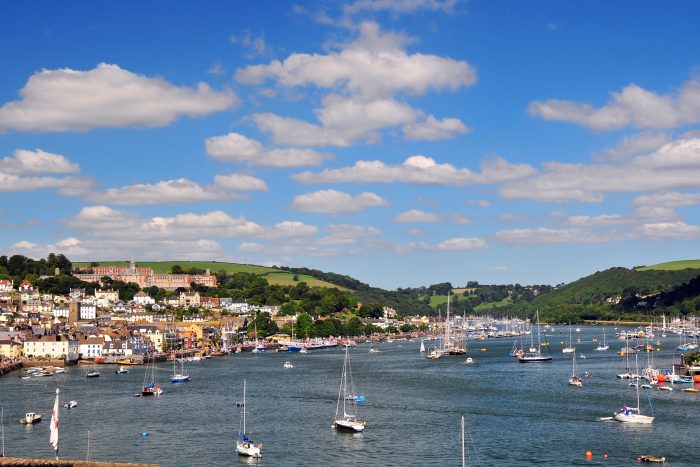Nestled on the western bank of the River Dart, lies the picturesque village of Dittisham. This charming settlement, often simply referred to as “Ditsum,” boasts a rich history intertwined with maritime heritage, agricultural development and a deep connection to the natural beauty of the Dart Estuary.
Walking through Dittisham today, visitors are treated to a visual history lesson. The village is dotted with well-preserved historic buildings, including the 14th-century St. George’s Church, which stands as a testament to the village’s medieval roots. The church’s striking tower has long served as a landmark for sailors navigating the river.
The village’s narrow, winding streets are lined with charming cottages, many of which date back to the 16th and 17th centuries. These buildings, constructed with traditional Devon cob and thatch, offer a glimpse into the architectural practices of the past.
Early Beginnings and Medieval Roots
The history of Dittisham can be traced back to ancient times, with evidence of habitation dating to the Iron Age. The village’s name likely derives from its early Saxon origins and is thought to be named after ‘Deedas’, a Saxon Chief who settled here in around 660AD.
Following the Saxon invasion of Devon, the original Celtic tribes were either conquered or driven out by 755 AD. The Saxon influence became pronounced with settlements like Totnes and a defended centre, or ‘burh,’ established in 900 AD at Halwell, just five miles west of Dittisham, during the reign of Edward the Elder, son of Alfred the Great.
Originally pagan, the Saxons’ conversion to Christianity is marked by the existence of a church in Dittisham by 1055. Upon Edward the Confessor’s death in 1066, Dittisham Manor was held by Bishop Leofric, reflecting the area’s conversion to Christianity.
During the medieval period, Dittisham emerged as a significant agricultural community. The Domesday Book of 1086 records the village under the name ‘Didashim’. The fertile lands surrounding the village made it ideal for farming, and the River Dart provided a vital transportation route for goods and produce.
Maritime Heritage and Economic Growth
The strategic location of Dittisham along the River Dart facilitated its growth as a maritime hub. By the 14th century, the village was bustling with activity related to fishing, boatbuilding and trade. The river was a crucial artery for transporting goods to and from the bustling market towns of Dartmouth and Totnes.
The 15th century saw notable figures connected to Dittisham. John Bozum’s daughter, Elizabeth, married Sir Baldwin Fulford, sheriff of Devon in 1459, bringing the Dittisham estate into the Fulford family. Their descendants included influential figures like John Fulford, Canon and Archdeacon of Exeter, and Thomazin Fulford, from whom the Earls and Dukes of Bedford are descended.
The Elizabethan era brought three influential men from the Dart region: Sir Humphrey Gilbert, his half-brother Sir Walter Raleigh, and their friend John Davis. Gilbert, born at Greenway House near Dittisham, led the expedition founding Newfoundland. Raleigh, an explorer of Virginia and South America, introduced tobacco and mahogany to Europe. Davis, an Arctic explorer, discovered the Davis Strait. These men, along with contemporaries like Drake, Hawkins and Grenville, left indelible marks on world history.
During the 18th and 19th centuries, Dittisham‘s economy flourished, driven by the fishing industry, particularly the trade in salmon and oysters. The village’s boatyards were renowned for building sturdy vessels that navigated the Dart and beyond. This period also saw the rise of the fruit-growing industry, with orchards producing renowned Dittisham plums and other varieties of fruit that were shipped to markets across England.
World War II and Post-War Changes
World War II brought significant change to Dittisham. Many evacuees came to live in the village during the war years, plus volunteers and little boats from the Dart joined in the miracle of the Dunkirk rescue in 1940! Additionally, the River Dart hosted American landing craft and support vessels preparing for the Normandy invasion in 1944.
Post-war, Dittisham transitioned from self-sufficiency to a more tourism-oriented economy. The village adapted to changing times, with increased property values and a rise in second homes. Despite these changes, Dittisham remains a vibrant community, balancing its historical legacy with modern life.
Modern-Day Dittisham
In contemporary times, Dittisham has evolved from its industrious past into a tranquil haven cherished by locals and visitors alike. The village’s scenic beauty and serene atmosphere make it a popular destination for tourists seeking a peaceful retreat.
Despite its small size, Dittisham retains a vibrant community spirit. The village hosts annual events such as the Dittisham Regatta, a tradition dating back over a century. This lively event celebrates the village’s maritime heritage with boat races, rowing competitions, and a host of other festivities.
Additionally, the proximity to the South Devon National Landscape (previously AONB) ensures that Dittisham remains a haven for nature lovers. The surrounding countryside offers ample opportunities for hiking, birdwatching and exploring the diverse flora and fauna of the region.
Whether you’re drawn by its history, its landscapes, or its vibrant community, Dittisham offers a timeless escape into the heart of Devon.
To find out more about modern-day Dittisham click here.
If you’ve visited Dittisham, or if you’re planning to, we’d love to see your photos of this wonderful village! Be sure to tag us in your posts on Facebook, X, and Instagram for a chance to be reshared on our pages – and don’t forget to give us a follow whilst you’re at it!






